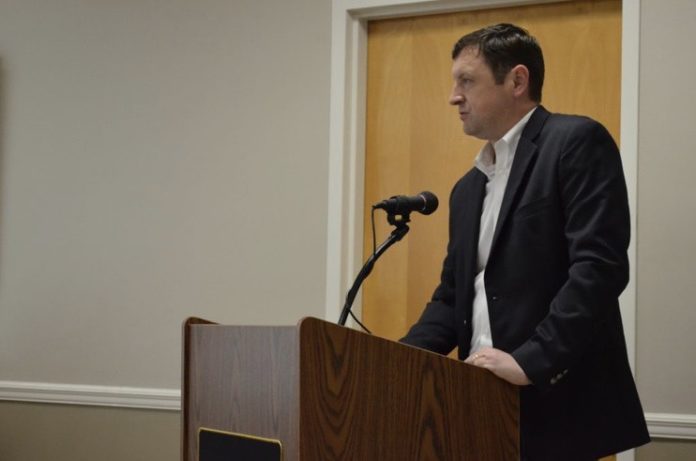CULLMAN, Ala. – Around six months ago, WellStone Behavioral Health, which serves Cullman and Madison Counties, became one of five agencies in the state of Alabama to receive grants from the Alabama Department of Mental Health (ADMH) to administer a program known as the Stepping Up Initiative. The initiative is described by the ADMH as “a national program with the goal to reduce the numbers of individuals in jails with mental illness. It is managed at the county level to establish effective partnerships across individuals in law enforcement, local governmental entities, elected officials, mental health and healthcare providers, courts and any others needed to meet the goal.”
In announcing the initiative last year, State Mental Health Commissioner Lynn Beshear wrote, “Today our local jails and hospitals – neither of which have it as their mission – are serving as mental health providers, which is creating a dire situation that is both dangerous and unsustainable. It is incumbent upon communities and regions to work together in partnership to reduce the number of individuals with mental illness in jails and ERs and to direct these individuals to the appropriate care. It will be a win for those individuals, a win for the community and indeed for the entire state and prison system.”
In addition to WellStone, other FY 2019 grant recipients included:
- Mental Health Board of Chilton and Shelby Counties, Inc.
- Cherokee-Etowah-Dekalb Mental Health Center
- Marshall-Jackson Mental Health Board. Inc.
- Mental Health Center of North Central Alabama Inc.
This week, The Tribune spoke with WellStone COO Chris Van Dyke about how the initiative is working in Cullman County.
“We’ve had to modify things along the way, because, you know, being a new concept and all of that, there’s been a lot of hurdles to overcome,” he said, “but we feel like it’s been beneficial. We started with our case manager- I think we hired her in November- and we’ve been doing case management follow-up at the jail and at the hospital, to try and reduce recidivism.”
Under the initiative so far, WellStone has evaluated 172 patients at Cullman Regional.
Of those:
- 86 had substance abuse issues
- 135 had a mental illness
“You can see those numbers don’t equal 172, so some people have both,” said Van Dyke.
Are you seeing more drug use leading to mental illness, or attempts to self-treat mental illness leading to drug abuse?
Said Van Dyke, “We really don’t focus on what started when with somebody who we know has both problems. We just focus on what they need to start recovery.”
After diagnosis, patients were referred for services:
- 58 patients went into inpatient treatment at residential facilities
- 99 went into outpatient treatment programs
Defining success
Stepping Up is not a program from which patients “graduate.”
Instead, as Van Dyke explained, “The Stepping Up program doesn’t focus on the long-term treatment as much as it does making the connections and the case management part. We’ve had a few cases that are really complicated that the Stepping Up case manager has worked intensively on. I think, off the top of my head, about nine people that she’s worked with really closely, trying to get their needs met. And you know, those cases are so complicated, that sometimes it looks like there’s no success there. Sometimes you know, even though the person’s still not doing as well as we would like them to, it would have been a lot worse if we wouldn’t have been in there working with them.”
In essence, Stepping Up has accomplished something positive every time it links victims of mental illness or addiction with resources that can help them. Every patient who enters treatment instead of a hospital or jail is a success for the program. It is a success as well for the hospitals that can free up beds and emergency room space, and for county legal systems that can reduce jail populations and also reduce the amount of taxpayer money being spent each day to house those inmates.
WellStone is currently gathering data on the referred patients who entered treatment.
A shift in approach
Van Dyke reported that diagnosing inmates at the Cullman County Detention Center has been hindered by a requirement that the inmates voluntarily submit to evaluation, sharing, “We’re also going to be transitioning from working in the jail to working with the court system. We’ve worked out a system with the judges so that they can order somebody to come for a mental health evaluation, and this case manager, Stepping Up case manager, is going to make sure they follow up and communicate with the judges.”
Circuit Judge Gregory Nicholas told The Tribune, “People with mental illness are generally able to function normally in society so long as they are taking their medication properly and following their recommended treatment plan. It’s when individuals stop taking their medication and don’t follow up on treatment that they start to decompensate and will oftentimes pose a threat of harm to themselves or to others.
“As a result of changes in court procedure that have recently been implemented, the judge presiding over a defendant’s criminal case will be notified immediately if a defendant has failed to comply fully with a court ordered treatment plan and action can be taken to bring the defendant back into compliance before his or her mental condition worsens to the point that the individual could present a threat to community safety.”
“We’re pulling out of the jail,” continued Van Dyke, “because we were required to ask the person if they wanted to be screened, if we could help them. What we’re finding is that, in the jail environment, everybody said no. It was not the best use of our time.
“Hopefully, with this court system, when the judge says, ‘You need to come get evaluated,’ they will.”
The future of Stepping Up: more counties, finding funding
While grant money has only gone to a few counties, 15 counties have passed resolutions to participate in efforts to create partnerships between mental health authorities, hospitals and law enforcement agencies in their communities. ADMH has advertised for local entities across the state to apply for a new round of grants for next year.
Van Dyke said, “Stepping Up is an initiative that the Commissioner of Mental Health really wants to roll out to all the Alabama counties, and, since she’s been commissioner, we’ve had a lot more counties come online with becoming Stepping Up counties. This round of grants is going to move on next year to other counties. This won’t be renewed for our current set of counties, because the commissioner wants to get it started in another set of six counties.”
Van Dyke plans to continue to provide services even if the grant money goes away, and hopes to be able to demonstrate that the program is valuable enough to continue, even if funding must come from other sources.
Note: WellStone’s Stepping Up case manager has recently resigned, and the agency is currently searching for a replacement with a bachelor’s degree in a human services-related field.
Copyright 2019 Humble Roots, LLC. All Rights Reserved.
























